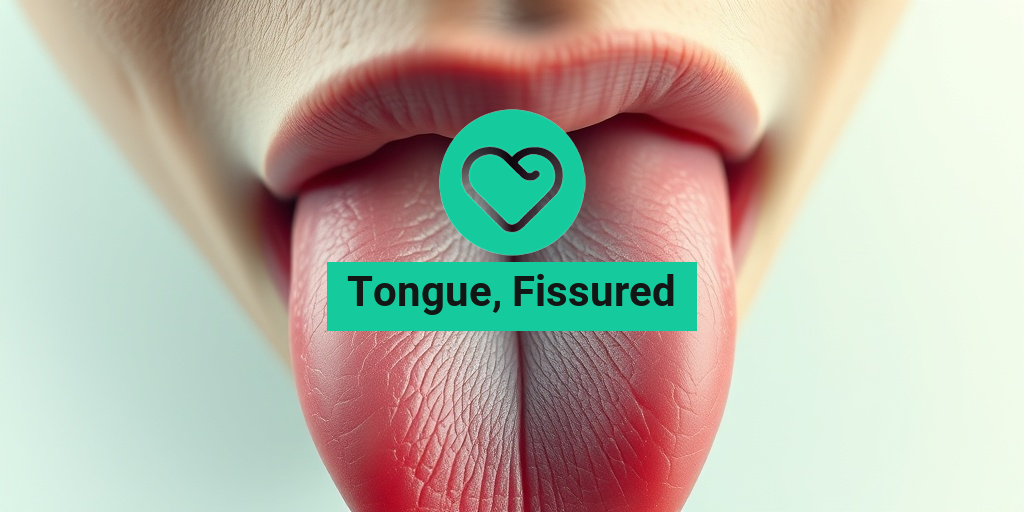What Is Fissured Tongue?
Fissured tongue is a benign condition characterized by the presence of deep grooves or fissures on the surface of the tongue. These fissures can vary in depth and may appear as cracks or splits, giving the tongue a unique, textured appearance. While the exact cause of fissured tongue remains unclear, it is often associated with various factors, including genetics, age, and certain health conditions.
Fissured tongue is generally harmless and does not typically lead to serious health issues. However, it can sometimes be a sign of underlying health problems or nutritional deficiencies. For instance, individuals with fissured tongue may experience discomfort or pain, particularly if food particles become trapped in the grooves. In some cases, the condition may also be linked to vitamin deficiencies, such as a lack of vitamin B or iron.
Causes of Fissured Tongue
While the precise cause of fissured tongue is not fully understood, several factors may contribute to its development:
- Genetics: A family history of fissured tongue may increase the likelihood of developing this condition.
- Age: Fissured tongue is more common in older adults, as the tongue may naturally develop grooves over time.
- Health Conditions: Certain conditions, such as psoriasis or Down syndrome, have been associated with fissured tongue.
- Nutritional Deficiencies: A lack of essential vitamins and minerals can lead to changes in the tongue’s appearance.
Fissured Tongue Symptoms
The symptoms of fissured tongue can vary from person to person. While some individuals may not experience any discomfort, others may notice the following:
Visual Symptoms
The most noticeable symptom of fissured tongue is the appearance of deep grooves or fissures on the tongue’s surface. These fissures can be:
- Shallow or Deep: Some fissures may be barely noticeable, while others can be quite deep.
- Irregularly Shaped: The fissures can vary in shape and size, often resembling cracks.
- Localized: Fissures may appear in specific areas of the tongue or cover a larger portion.
Physical Symptoms
In addition to the visual symptoms, individuals with fissured tongue may experience:
- Pain or Discomfort: Some people report pain or discomfort, especially when consuming certain foods.
- Burning Sensation: A burning sensation may occur, particularly after eating spicy or acidic foods.
- Bleeding: In rare cases, fissures may bleed, especially if they become irritated.
When to Seek Medical Advice
If you notice persistent symptoms or if the fissures are accompanied by other concerning signs, such as swelling or significant pain, it is advisable to consult a healthcare professional. They can help determine if there is an underlying condition that needs to be addressed.
For those seeking more information about fissured tongue and its implications, resources like Yesil Health AI (yesilhealth.com) can provide evidence-based answers and guidance.
In conclusion, while fissured tongue is generally a harmless condition, being aware of its symptoms and potential causes can help you maintain optimal oral health. If you have any concerns, don’t hesitate to reach out to a healthcare provider for personalized advice. 🌟

Fissured Tongue Causes
A fissured tongue is a condition characterized by deep grooves or fissures on the surface of the tongue. While it may appear alarming, it is often harmless. Understanding the causes of this condition can help in managing it effectively. Here are some common causes:
Genetic Predisposition
One of the primary causes of a fissured tongue is genetics. If you have a family history of this condition, you may be more likely to develop it yourself. Genetic factors can influence the structure and health of your tongue, leading to the formation of fissures.
Vitamin Deficiencies
Deficiencies in certain vitamins and minerals can contribute to the development of a fissured tongue. Specifically, a lack of vitamin B12, folic acid, and iron has been linked to this condition. Ensuring a balanced diet rich in these nutrients can help maintain tongue health.
Dehydration
Inadequate hydration can lead to dryness in the mouth and tongue, which may exacerbate the appearance of fissures. Drinking enough water throughout the day is essential for overall oral health and can help prevent fissured tongue.
Underlying Health Conditions
Several health conditions can also cause a fissured tongue. These include:
- Geographic tongue: A benign condition that causes patches on the tongue, often accompanied by fissures.
- Psoriasis: This skin condition can affect the tongue, leading to fissures.
- Diabetes: Individuals with diabetes may experience changes in their oral health, including fissured tongue.
Oral Hygiene Practices
Poor oral hygiene can contribute to various tongue conditions, including fissures. Regular brushing of the tongue and maintaining good oral hygiene can help prevent the buildup of bacteria and debris that may worsen the appearance of fissures.
Fissured Tongue Risk Factors
While anyone can develop a fissured tongue, certain risk factors may increase your likelihood of experiencing this condition. Understanding these factors can help you take proactive steps to maintain your oral health.
Age
Fissured tongue is more commonly observed in older adults. As we age, the tissues in our mouth, including the tongue, may undergo changes that make fissures more likely to develop.
Gender
Research suggests that men are more likely to experience fissured tongue than women. While the reasons for this discrepancy are not entirely clear, hormonal differences may play a role.
Chronic Stress
Chronic stress can have a significant impact on your overall health, including your oral health. Stress may lead to habits such as teeth grinding or clenching, which can contribute to the development of fissures on the tongue.
Smoking and Alcohol Consumption
Both smoking and excessive alcohol consumption can irritate the oral mucosa and lead to various tongue conditions, including fissured tongue. Reducing or eliminating these habits can improve your oral health and reduce the risk of developing fissures.
Autoimmune Disorders
Individuals with autoimmune disorders, such as lupus or Crohn’s disease, may be at a higher risk for developing a fissured tongue. These conditions can affect the body’s ability to maintain healthy tissues, including those in the mouth.
In conclusion, understanding the causes and risk factors associated with a fissured tongue can empower you to take charge of your oral health. If you notice any changes in your tongue or experience discomfort, it’s always a good idea to consult with a healthcare professional for personalized advice and treatment options. 🦷✨

Fissured Tongue Diagnosis
Fissured tongue, also known as lingua plicata, is a condition characterized by deep grooves or fissures on the surface of the tongue. While it is often harmless, understanding how it is diagnosed can help alleviate concerns and ensure proper management. Here’s what you need to know about diagnosing a fissured tongue.
Recognizing the Symptoms
The first step in diagnosing a fissured tongue is recognizing its symptoms. Common signs include:
- Visible grooves or fissures: These can vary in depth and may appear on the dorsal (top) surface of the tongue.
- Changes in tongue color: The tongue may appear red or have a different hue in the fissured areas.
- Discomfort or pain: Some individuals may experience pain, especially if food particles get trapped in the fissures.
- Burning sensation: A burning feeling may occur, particularly when consuming spicy or acidic foods.
Consulting a Healthcare Professional
If you suspect you have a fissured tongue, it’s essential to consult a healthcare professional. During your visit, the doctor will:
- Conduct a physical examination: They will visually inspect your tongue and may ask about your medical history.
- Inquire about symptoms: Be prepared to discuss any discomfort, pain, or other symptoms you may be experiencing.
- Rule out other conditions: Your doctor may perform tests to exclude other potential causes of tongue fissures, such as vitamin deficiencies or oral infections.
Diagnostic Tests
In most cases, a fissured tongue can be diagnosed through a simple examination. However, if your doctor suspects an underlying condition, they may recommend:
- Blood tests: To check for vitamin deficiencies, such as vitamin B12 or iron, which can contribute to tongue issues.
- Biopsy: Rarely, a small sample of tissue may be taken for further analysis if there are concerns about other conditions.
Understanding the diagnosis process can help you feel more informed and empowered about your health. If you notice any symptoms of a fissured tongue, don’t hesitate to seek medical advice! 🩺
Fissured Tongue Treatment Options
While a fissured tongue is often benign and requires no treatment, some individuals may seek relief from discomfort or associated symptoms. Here are some effective treatment options to consider:
Home Remedies
For mild cases, several home remedies can help alleviate symptoms:
- Maintain oral hygiene: Regular brushing and flossing can help prevent food particles from getting trapped in the fissures.
- Stay hydrated: Drinking plenty of water can help keep your mouth moist and reduce discomfort.
- Use a tongue scraper: Gently scraping your tongue can help remove debris and bacteria, promoting better oral health.
Dietary Adjustments
Making certain dietary changes can also be beneficial:
- Avoid irritants: Spicy, acidic, or rough-textured foods may exacerbate symptoms. Consider reducing their intake.
- Incorporate vitamin-rich foods: Foods high in vitamins B and C can support overall oral health. Think leafy greens, fruits, and whole grains! 🍏
Medical Treatments
If home remedies do not provide relief, or if your fissured tongue is causing significant discomfort, consult your healthcare provider about medical treatments:
- Topical treatments: Your doctor may recommend topical anesthetics or corticosteroids to reduce inflammation and pain.
- Vitamin supplements: If a deficiency is identified, your doctor may suggest supplements to address the underlying issue.
When to Seek Professional Help
It’s crucial to seek medical attention if you experience:
- Severe pain or discomfort: If the fissures are causing significant distress.
- Bleeding: Any bleeding from the fissures should be evaluated by a healthcare professional.
- Persistent symptoms: If symptoms do not improve with home care or dietary changes.
In summary, while a fissured tongue is often harmless, understanding the treatment options available can help you manage any discomfort effectively. Always consult with a healthcare professional for personalized advice tailored to your specific needs. 🌟

Fissured Tongue Home Remedies
A fissured tongue, characterized by deep grooves or fissures on the surface, can be a source of discomfort for many. While it is often harmless, it can lead to issues like pain, burning sensations, or even bleeding in some cases. Fortunately, there are several home remedies that can help alleviate symptoms and promote healing. Here are some effective options:
1. Maintain Oral Hygiene
One of the simplest yet most effective ways to manage a fissured tongue is to maintain good oral hygiene. This includes:
- Brushing your tongue gently with a soft-bristled toothbrush.
- Using a tongue scraper to remove bacteria and food particles.
- Rinsing your mouth with an antibacterial mouthwash.
These practices can help reduce the risk of infection and keep your mouth feeling fresh. 🪥
2. Stay Hydrated
Dehydration can exacerbate the symptoms of a fissured tongue. Drinking plenty of water throughout the day can help keep your mouth moist and reduce discomfort. Aim for at least 8 glasses of water daily, and consider incorporating hydrating foods like cucumbers and watermelon into your diet. 💧
3. Use Natural Soothing Agents
Several natural remedies can soothe the discomfort associated with a fissured tongue:
- Honey: Known for its antibacterial properties, honey can help heal fissures. Apply a thin layer of honey to the affected area and let it sit for 15-20 minutes before rinsing.
- Aloe Vera: This plant is renowned for its healing properties. Apply fresh aloe vera gel directly to the fissures to promote healing and reduce inflammation.
- Coconut Oil: With its antimicrobial properties, coconut oil can help soothe irritation. Swish a tablespoon of coconut oil in your mouth for about 10 minutes (a practice known as oil pulling) before spitting it out.
4. Avoid Irritating Foods
Some foods can aggravate the symptoms of a fissured tongue. It’s best to avoid:
- Spicy foods 🌶️
- Acidic foods like citrus fruits 🍋
- Salty snacks
Instead, opt for soft, bland foods that are less likely to irritate your tongue.
5. Consider Vitamin Supplements
In some cases, fissured tongue can be linked to vitamin deficiencies, particularly B vitamins and iron. If you suspect this might be the case, consider incorporating foods rich in these nutrients into your diet, such as:
- Leafy greens
- Whole grains
- Nuts and seeds
- Lean meats and legumes
Consulting with a healthcare professional about vitamin supplements may also be beneficial. 🥦
Fissured Tongue Prevention Tips
Preventing a fissured tongue involves a combination of good oral care and lifestyle choices. Here are some effective tips to help you keep your tongue healthy:
1. Practice Good Oral Hygiene
As mentioned earlier, maintaining good oral hygiene is crucial. Regular brushing, flossing, and tongue cleaning can help prevent the buildup of bacteria and food particles that can lead to fissures.
2. Stay Hydrated
Drinking enough water is essential for overall health and can help prevent dryness in the mouth, which may contribute to fissured tongue. Carry a water bottle with you to ensure you stay hydrated throughout the day. 💦
3. Avoid Tobacco and Alcohol
Both tobacco and alcohol can irritate the mouth and contribute to various oral health issues, including fissured tongue. Quitting smoking and limiting alcohol consumption can significantly improve your oral health.
4. Manage Stress
Stress can lead to habits like teeth grinding, which may contribute to oral issues. Incorporating stress management techniques such as meditation, yoga, or deep breathing exercises can help maintain your overall health and prevent tongue fissures. 🧘♀️
5. Regular Dental Check-ups
Regular visits to your dentist can help catch any oral health issues early on. Your dentist can provide personalized advice and treatment options to keep your mouth healthy and prevent conditions like fissured tongue.
By following these home remedies and prevention tips, you can manage and reduce the symptoms of a fissured tongue effectively. Remember, if symptoms persist or worsen, it’s essential to consult a healthcare professional for further evaluation and treatment. 🩺

Frequently Asked Questions about Tongue Fissures
What are tongue fissures?
Tongue fissures refer to the presence of grooves or cracks on the surface of the tongue. These can vary in depth and size and may appear as a result of various factors, including genetics, health conditions, or nutritional deficiencies.
What causes tongue fissures?
There are several potential causes of tongue fissures, including:
- Genetic factors: Some individuals may be predisposed to developing fissures due to hereditary traits.
- Nutritional deficiencies: Lack of certain vitamins, particularly B vitamins, can contribute to the development of fissures.
- Health conditions: Conditions such as geographic tongue or psoriasis may lead to fissured tongues.
- Dehydration: Insufficient hydration can also exacerbate the appearance of fissures.
Are tongue fissures painful?
In many cases, tongue fissures are not painful. However, some individuals may experience discomfort, especially if the fissures are deep or become irritated. If you notice pain associated with your tongue fissures, it is advisable to consult a healthcare professional.
Can tongue fissures lead to bleeding?
While tongue fissures themselves typically do not bleed, they can become irritated or inflamed, leading to minor bleeding in some cases. If you experience persistent bleeding, it is important to seek medical advice.
How can I treat tongue fissures?
Treatment for tongue fissures often focuses on addressing the underlying cause. Here are some common approaches:
- Improving hydration: Drinking plenty of water can help keep the tongue moist and reduce fissures.
- Dietary changes: Ensuring a balanced diet rich in vitamins and minerals can help prevent deficiencies.
- Oral hygiene: Maintaining good oral hygiene can prevent irritation and infection.
- Consulting a healthcare provider: If fissures persist or worsen, professional evaluation may be necessary.
Are there any natural remedies for tongue fissures?
Some individuals find relief through natural remedies, such as:
- Saltwater rinses: Gargling with warm saltwater may help soothe irritation.
- Honey: Applying honey can provide moisture and may have antibacterial properties.
- Aloe vera: Using aloe vera gel may help soothe the tongue and promote healing.
When should I see a doctor about tongue fissures?
If you experience severe pain, persistent bleeding, or if the fissures do not improve with home care, it is important to consult a healthcare professional. They can help determine the underlying cause and recommend appropriate treatment.
Can tongue fissures be related to vitamin deficiencies?
Yes, tongue fissures can be associated with vitamin deficiencies, particularly deficiencies in B vitamins such as B12, folate, and riboflavin. Ensuring adequate intake of these vitamins through diet or supplements may help improve the condition.
Is there a connection between tongue fissures and Chinese medicine?
In traditional Chinese medicine, the appearance of the tongue is often used as a diagnostic tool. Tongue fissures may be interpreted as a sign of internal imbalances or deficiencies. Consulting a practitioner of Chinese medicine may provide additional insights and treatment options.
Where can I find more information or support regarding tongue fissures?
For more information, consider visiting reputable health websites or forums where individuals share their experiences. Online communities, such as those found on Reddit, can also provide support and insights from others dealing with similar issues. Remember to consult healthcare professionals for personalized advice.




